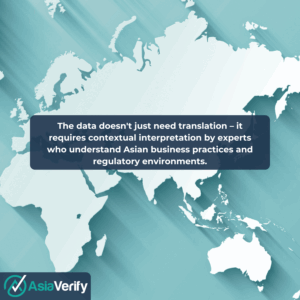Uncover the KYB, UBO, and KYC compliance complexities that global teams face in the APAC region

Home to dynamic economies and the most populous nations on the planet, APAC offers a wealth of unique opportunities for businesses looking to expand internationally. However, the very diversity that makes this region so appealing also introduces unique challenges.
Global organisations aiming to expand into APAC markets must conduct comprehensive verification in all new commercial engagements – whether they’re vetting potential business partners, merchants, clients or customers. This article outlines essential considerations for establishing a robust Know Your Business (KYB), Ultimate Beneficial Ownership (UBO) and Know Your Customer (KYC) framework that is well-suited to the APAC market.
Understanding APAC’s KYB, UBO and KYC Landscape
Challenge 1: Diverse Business Structures Across APAC
Asia is home to a broad range of businesses, from large multinational corporations to small startups, with a level of organisational maturity that varies widely across the region.
In such a multifaceted landscape, companies need flexible and scalable KYB, UBO and KYC processes that accommodate the vast differences in business sizes and types. Adding to the challenge is the complexity of many ownership structures in the region, which can make the onboarding process more difficult and costly for new business partners, merchants and customers.
Challenge 2: Rapid Growth Driving Higher Compliance Risk
The Association of Southeast Asian Nations (ASEAN), which includes countries such as Indonesia, Malaysia, the Philippines, Singapore and Thailand, is emerging as a significant economic force in the region. Factors that make ASEAN markets increasingly attractive to new business ventures include the burgeoning middle class, strategic geographic positioning and active investment in their physical and digital infrastructures.
However, firms need to be aware that economic expansion can attract not only legitimate businesses but also illicit activities, including money laundering and terrorist financing. This elevates the importance of conducting thorough KYB and UBO checks to identify and mitigate the risks associated with potentially hidden beneficial owners or complex corporate structures designed to obscure ownership.
Challenge 3: Language and Translation Barriers in Verification
With thousands of different languages spoken across the APAC region, many with their own distinct writing systems, companies need to build a sound translation strategy into their KYB, UBO and KYC programmes.
Businesses lacking the necessary tools to accurately translate and fully comprehend all the involved business, legal and personal information risk breaching AML (Anti-Money Laundering) and CFT (Counter Financing of Terrorism) regulations. Translation missteps or misunderstandings can result in flawed risk assessments, potentially missing crucial red flags or compliance problems.
Challenge 4: Fragmented Regulations Across APAC Jurisdictions
Unlike Europe, where regulatory frameworks are more harmonised, Asia presents a patchwork of vastly different legal systems and levels of economic development. Understanding the UBO structure of a business, for instance, can be particularly challenging when it involves entities spread across multiple jurisdictions with varying disclosure requirements. This requires in-depth local expertise and can significantly inflate the costs tied to compliance measures.
Book a 15-min demo and see how AsiaVerify accelerates onboarding, reduces false positives, and keeps you audit-ready.
How Technology Helps Solve APAC’s Verification Challenges
Technology has advanced to the point where it has become a highly valuable tool in the fight against financial crime, even in the most complex business landscapes. Organisations have access to innovative RegTech solutions that are designed to support their AML/CFT programmes with a range of capabilities.
For firms concentrating on APAC markets, selecting a technology solution specifically designed for this unique region is advisable. The right technology solution can elevate key KYB, UBO and KYC processes and mitigate risk through improved data accessibility and coverage, as well as greater accuracy.
One such option is AsiaVerify, a RegTech platform that allows global organisations to verify, onboard and monitor APAC business partners, customers and beneficial owners in real-time. Using AsiaVerify’s award-winning business verification platform, firms can streamline and enhance their KYB and KYC processes, ensuring a thorough understanding of organisations’ corporate and UBO structures.
Book a 15-min demo and see how AsiaVerify accelerates onboarding, reduces false positives, and keeps you audit-ready.








